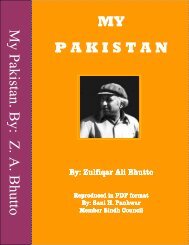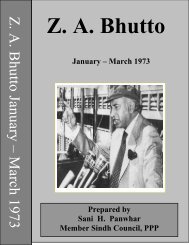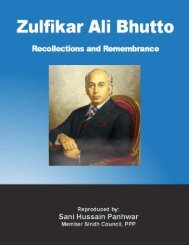- Page 2 and 3:
PREFACE This book is based on the e
- Page 4 and 5:
Murtaza and Shahnawaz both cut shor
- Page 6 and 7:
The Tragic Death of Murtaza Bhutto
- Page 8 and 9:
could not have opened fire on the m
- Page 10 and 11:
DIFFERENT NEWS ITEMS RIGHT AFTER TH
- Page 12 and 13:
does not treat medico-legal cases.
- Page 14 and 15:
BENAZIR VISITS MID-EAST HOSPITAL KA
- Page 16 and 17:
NO COMMENTS FROM BENAZIR & NUSRAT O
- Page 18 and 19:
MURTAZA'S SUPPORTERS CLING TO THE C
- Page 20 and 21:
BULLET HITTING NECK WAS FATAL KARAC
- Page 22 and 23:
MURTAZA'S BODY TAKEN TO 70 CLIFTON:
- Page 24 and 25:
IGP POLICE ORDERS ENQUIRY KARACHI,
- Page 26 and 27:
GRIM SITUATION IN LARKANA LARKANA,
- Page 28 and 29:
NA CONDOLES DEMISE OF MURTAZA ISLAM
- Page 30 and 31:
ARRANGEMENTS TO DISPATCH BODIES OF
- Page 32 and 33:
occurred at the hands of police. He
- Page 34 and 35:
SON & BROTHER OF ELECTED PRIME MINI
- Page 36 and 37:
Anwer Pirzado Writes It was the gri
- Page 38 and 39:
HUNT FOR SONARA’S CLOSE ASSOCIATE
- Page 40 and 41:
MIR MURDER FIR AGAINST BB, ZARDARI
- Page 42 and 43:
POLICE LEFT VICTIMS DYING ON THE RO
- Page 44 and 45:
MEDICAL BOARD TO EXAMINE CLIFTON SH
- Page 46 and 47:
told me about the Palestinians and
- Page 48 and 49:
PLOTS TO FINISH OFF BHUTTOS STILL O
- Page 50 and 51:
TEN INJURED AS POLICE, RIOTERS CLAS
- Page 52 and 53:
PM, ZARDARI INVOLVED IN MURTAZA'S M
- Page 54 and 55:
PM ASKS FOR A HIGH LEVEL FIA PROBE
- Page 56 and 57:
TEN INJURED AS POLICE RIOTERS CLASH
- Page 58 and 59:
SHO’s FOOT WOUND- SELF INFLICTED
- Page 60 and 61:
COMPLETE STRIKE OBSERVED IN KARACHI
- Page 62 and 63:
PM HOLDS A MEETING WITH TOP OFFICIA
- Page 64 and 65:
MURTAZA'S KILLING FINDINGS TO BE MA
- Page 66 and 67:
GHINWA TO MOVE SHC TO GET CASE REGI
- Page 68 and 69:
SUSPENDED: KARACHI, Sept 25, 1996:
- Page 70 and 71:
PPP (SB) CALLS FOR STRIKE TODAY KAR
- Page 72 and 73:
action against the police officials
- Page 74 and 75:
Mir Murtaza Bhutto and others, and
- Page 76 and 77:
equest in this regard. However, the
- Page 78 and 79:
other benefits as Sial was about to
- Page 80 and 81:
present state of social, economic a
- Page 82 and 83:
SELF-INFLICTED INJURIES PAKISTAN'S
- Page 84 and 85:
arrows. But having gone through a l
- Page 86 and 87:
acquired in the last couple of year
- Page 88 and 89:
SIAL'S DEATH WAS A CASE OF HOMICIDE
- Page 90 and 91:
MEDICAL BOARD RESERVES FINDINGS IN
- Page 92 and 93: SHC HEARS GHINWA, BADRUNNISA PETITI
- Page 94 and 95: ASP HAYAT'S STATEMENT DEEPENS MYSTE
- Page 96 and 97: police party took the entire operat
- Page 98 and 99: The PPP secretary-general said the
- Page 100 and 101: MURTAZA'S DEATH WAS ACCIDENTAL, SAY
- Page 102 and 103: SHC HEARS ARGUMENTS ON FIR REGISTRA
- Page 104 and 105: The arguments were continuing when
- Page 106 and 107: The court was about to rise for the
- Page 108 and 109: HOME SECRETARY, IGP, DIG TO RECORD
- Page 110 and 111: ELEVEN COPS HELD IN MURTAZA CASE Mo
- Page 112 and 113: GHINWA VOWS TO UNMASK KILLERS LARKA
- Page 114 and 115: MURTAZA'S KILLERS TO BE BROUGHT TO
- Page 116 and 117: POLICE TAKES REMAND OF 11 COPS IN M
- Page 118 and 119: GHINWA'S LAWYER ACCUSES CM, BABAR,
- Page 120 and 121: Q: Who informed you? HS: I was atte
- Page 122 and 123: Q: In the daily reports of Septembe
- Page 124 and 125: HS: Neither myself nor the home dep
- Page 126 and 127: The DIG then told me that he was be
- Page 128 and 129: IG: No. Q: Are you aware of any suc
- Page 130 and 131: Q: Is it correct that in the two-mo
- Page 132 and 133: The Chief Minister Syed Abdullah Sh
- Page 134 and 135: September 18. To a question, he sai
- Page 136 and 137: Q: When the SSP brought to your not
- Page 138 and 139: A: The orders remained in force exc
- Page 140 and 141: ARGUMENTS ON ISSUE OF THIRD FIR CON
- Page 144 and 145: EXPERTS MAY EXHUME MURTAZA’S BODY
- Page 146 and 147: INQUIRIES AGAINST POLICE BUT NO ACT
- Page 148 and 149: Q: Who controls the Rangers? A: The
- Page 150 and 151: Q: Is it correct that the raids con
- Page 152 and 153: The tribunal's hearing concluded at
- Page 154 and 155: The DIG said he had given these ins
- Page 156 and 157: The DIG produced the standing order
- Page 158 and 159: DURRANI SAYS SUDDLE OKAYED THE OPER
- Page 160 and 161: According to information provided t
- Page 162 and 163: people named by Ali Sonara as, acco
- Page 164 and 165: "I made it a point to be there much
- Page 166 and 167: A: APC could not have stopped it an
- Page 168 and 169: SHARIF, SUDDLE, DURRANI, 7 COPS NAM
- Page 170 and 171: DURRANI HELD IN MURTAZA CASE By Moh
- Page 172 and 173: TWO ASPS GRANTED INTERIM BAIL BEFOR
- Page 174 and 175: III. That on return from said publi
- Page 176 and 177: SUDDLE GRANTED PRE-ARREST BAIL KARA
- Page 178 and 179: PRE-ARREST BAIL OF SHO ZEESHAN DISM
- Page 180 and 181: CRIME BRANCH INTERROGATING IB CHIEF
- Page 182 and 183: Question from Tribunal: Were you gi
- Page 184 and 185: he has been conducting raids, but n
- Page 186 and 187: Question from Manzoor Bhutta, couns
- Page 188 and 189: DURRANI SHIFTED TO BUNGALOW KARACHI
- Page 190 and 191: Tariq Road; Mohammad Rafique, 26, s
- Page 192 and 193:
pulling down late Ashique Jatoi fro
- Page 194 and 195:
MURTAZA WAS HOSPITALISED IN CRITICA
- Page 196 and 197:
A: For medico-legal purposes we wer
- Page 198 and 199:
Tribunal: Why didn't you ask your h
- Page 200 and 201:
Bhutta for Dr Memon; and Nadeem Qur
- Page 202 and 203:
ALLIANCE: In reply to a question, M
- Page 204 and 205:
Murtaza Bhutto; Copyright © www.bh
- Page 206 and 207:
DETECTIVES HINT AT CONSPIRACY IN MU
- Page 208 and 209:
Tribunal: Since when this policy wa
- Page 210 and 211:
A: I did neither see any police veh
- Page 212 and 213:
Q: When you went to the place of in
- Page 214 and 215:
A: I received two reports from the
- Page 216 and 217:
Q: On what charges you arrested him
- Page 218 and 219:
A: There might be about 10-15 blind
- Page 220 and 221:
A: No, I was not among them. Only o
- Page 222 and 223:
Another SHO involved in the case, Z
- Page 224 and 225:
WE TOOK PHOTOS BY DODGING THE POLIC
- Page 226 and 227:
At the end, Justice Nasir asked whe
- Page 228 and 229:
At this stage, witness Mohammad Ali
- Page 230 and 231:
Q: Who identified Ashiq Jatoi's bod
- Page 232 and 233:
A: The SDM, SSP, DIG and other seni
- Page 234 and 235:
ackground of his presence at the sc
- Page 236 and 237:
MIR HAD LITTLE CHANCE OF SURVIVAL W
- Page 238 and 239:
heart revived which is a rare pheno
- Page 240 and 241:
A: None. This is the first time tha
- Page 242 and 243:
A: I was not told of any such thing
- Page 244 and 245:
A: Yes, but till about 2 am to 3:30
- Page 246 and 247:
A: The mood of the crowd was anti-p
- Page 248 and 249:
HOW SEVEN SDMS COULD FAIL TO FIND T
- Page 250 and 251:
said he received the information ab
- Page 252 and 253:
with the police and abused them and
- Page 254 and 255:
GHINWA RELEASES PARTY MANIFESTO LAH
- Page 256 and 257:
I WAS NOT TOLD BY POLICE BEFORE THE
- Page 258 and 259:
A: An emotion-charged crowd of 2,00
- Page 260 and 261:
The witness, who was in his room at
- Page 262 and 263:
lying near a vehicle, which was inj
- Page 264 and 265:
HOW 7 SDMS COULD FAIL TO FIND THE D
- Page 266 and 267:
not available, when I contacted aga
- Page 268 and 269:
time then was about 10:30 pm. There
- Page 270 and 271:
FOUR POLICEMEN BROUGHT MIR & LEFT I
- Page 272 and 273:
Q: Any reason for not publishing at
- Page 274 and 275:
Majeed had registered the complaint
- Page 276 and 277:
Another MLO, who was examined earli
- Page 278 and 279:
A: The questions were about the bor
- Page 280 and 281:
MIR MAY HAVE SURVIVED KARACHI, Dec.
- Page 282 and 283:
Q: Do you agree that the post-morte
- Page 284 and 285:
ody. On a question from the tribuna
- Page 286 and 287:
and victimisation of the PPP contin
- Page 288 and 289:
SIAL'S DEATH WAS HOMICIDE: MLO KARA
- Page 290 and 291:
A: It was done on Nov 28 after his
- Page 292 and 293:
ASIF ZADRARI AND OTHERS PRODUCED IN
- Page 294 and 295:
The court directed the police to le
- Page 296 and 297:
are non-professionals and unqualifi
- Page 298 and 299:
A: I did nothing. Q: What was the p
- Page 300 and 301:
authorized by the government. Only
- Page 302 and 303:
POSTMORTEM IS PRACTICALLY DONE BY U
- Page 304 and 305:
A: Yes. If they are asked to do it
- Page 306 and 307:
COURT REJECTS POLICE REMAND FOR ASI
- Page 308 and 309:
easily accessible, least dangerous
- Page 310 and 311:
Najam, current affairs producer. Th
- Page 312 and 313:
"We should have written as you are
- Page 314 and 315:
A: There are Prof. I. Jokhio, Dr. Y
- Page 316 and 317:
Asghar Ali, a personal servant of M
- Page 318 and 319:
MURTAZA CASE: WITNESSES SEEK TIME T
- Page 320 and 321:
TRIBUNAL DISSATISFIED WITH MEDICAL
- Page 322 and 323:
A. Shah, the SDM, which he denied l
- Page 324 and 325:
The counsel for Sharif and Shah sou
- Page 326 and 327:
Q: What reasons the two doctors gav
- Page 328 and 329:
Chairman: Was that a child's play.
- Page 330 and 331:
A: Our professional ethics do not p
- Page 332 and 333:
The witness was warned several time
- Page 334 and 335:
Q: Was the intention to replace the
- Page 336 and 337:
Shafi Quraishy, principal of DMC an
- Page 338 and 339:
Q: In your earlier statement before
- Page 340 and 341:
Q: Apparently you were told by some
- Page 342 and 343:
2. In the process of news gathering
- Page 344 and 345:
Q: The second report you signed was
- Page 346 and 347:
A: One of the four doctors, Dr Kari
- Page 348 and 349:
At that time, he said, he left the
- Page 350 and 351:
A: I don't nominate. I ask the addi
- Page 352 and 353:
The tribunal started its proceeding
- Page 354 and 355:
A: There was equal urgency in this
- Page 356 and 357:
A: I did ask them for putting the d
- Page 358 and 359:
College from Lahore. But the fact w
- Page 360 and 361:
Zulfiqar Ali, who were all posted i
- Page 362 and 363:
emergency. Ashiq Jatoi's friends an
- Page 364 and 365:
SPOT MEMO WAS NOT PREPARED ON THE S
- Page 366 and 367:
A: I made no mention about the pres
- Page 368 and 369:
Earlier, Karim Khan Agha, counsel f
- Page 370 and 371:
which were kept on record. Many off
- Page 372 and 373:
MIR HAD NAMED CONSPIRATORS HOURS BE
- Page 374 and 375:
A: During the MRD movement for eigh
- Page 376 and 377:
said they should have told him abou
- Page 378 and 379:
He had not made entries in the "Roz
- Page 380 and 381:
Q: Does Police Rules permit you to
- Page 382 and 383:
IO VIOLATED RULES TRIBUNAL EXAMINES
- Page 384 and 385:
A: No finger-prints were taken and
- Page 386 and 387:
A: He alone can answer that questio
- Page 388 and 389:
A: Photographs were not there when
- Page 390 and 391:
A: Yes. He had told me that Shukaib
- Page 392 and 393:
Q: Yesterday (Tuesday) when you app
- Page 394 and 395:
JUSTICE ZAHID ASKS REPORTER'S COUNS
- Page 396 and 397:
Chairman: We will also have to look
- Page 398 and 399:
Oct. 12 when he was informed by the
- Page 400 and 401:
practitioner, Dr S. M. A. Shah, in
- Page 402 and 403:
Q: Photographs are normally taken a
- Page 404 and 405:
This was because the then DIG Shoai
- Page 406 and 407:
office and insisted on the formatio
- Page 408 and 409:
UK DETECTIVES WERE PAID 200,000 POU
- Page 410 and 411:
A: In the meeting at my office ther
- Page 412 and 413:
A: We have no competent people and
- Page 414 and 415:
MURTAZA BHUTTO TRIBUNAL PROCEEDINGS
- Page 416 and 417:
GHINWA FAILS TO APPEAR BEFORE TRIBU
- Page 418 and 419:
CLIFTON KILLINGS SUMMARY OF BRITISH
- Page 420 and 421:
Saddar was in the group of officers
- Page 422 and 423:
provide some independent evidence a
- Page 424 and 425:
MQM government, Ghinwa Bhutto said
- Page 426 and 427:
Sarfraz declined to offer any comme
- Page 428 and 429:
MURTAZA BHUTTO TRIBUNAL BHATTI TEST
- Page 430 and 431:
When Begum Nusrat Bhutto was unjust
- Page 432 and 433:
Syrian President's plane and it was
- Page 434 and 435:
tribunal consisted of Mr Justice Am
- Page 436 and 437:
As for Ms Benazir, she vehemently o
- Page 438 and 439:
From then on Ms Benazir built an at
- Page 440 and 441:
As it was evident from the actions
- Page 442 and 443:
A: During the unrest in Karachi, we
- Page 444 and 445:
Naek. She started her evidence in E
- Page 446 and 447:
and where. The phone bills of 70-Cl
- Page 448 and 449:
She said on Sept 22, the president
- Page 450 and 451:
GHINWA HOLDS POLICE RESPONSIBLE FOR
- Page 452 and 453:
which "my husband said I am attacki
- Page 454 and 455:
Q: Did he tell you that he feared f
- Page 456 and 457:
that they had done so under the thr
- Page 458 and 459:
AIG PLACES ON RECORD EVALUATION REP
- Page 460 and 461:
BENAZIR DENIES HAND IN MIR'S ARREST
- Page 462 and 463:
on behalf of the government of Sind
- Page 464 and 465:
Q: Was there any animosity at that
- Page 466 and 467:
A: I don't read Urdu newspapers. I
- Page 468 and 469:
Q: Hakim Ali Zardari was not on goo
- Page 470 and 471:
Q: Is it a fact that hot words were
- Page 472 and 473:
Nawaz the then C-in-C.To her mind,
- Page 474 and 475:
spent on the investigation of the k
- Page 476 and 477:
A: I don't know. Q: Is it correct t
- Page 478 and 479:
Q: Are you aware that Ali Mohammad
- Page 480 and 481:
A 30 bore pistol recovered from Ghu
- Page 482 and 483:
asked whether Mir had sand on his s
- Page 484 and 485:
TWO SHOTS WERE FIRED FROM PISTOL KA
- Page 486 and 487:
A: No. Q: The board constituted to
- Page 488 and 489:
answer to this question was sought
- Page 490 and 491:
then SHO of the Clifton PS, and Asg
- Page 492 and 493:
Out of the nine FIR's registered un
- Page 494 and 495:
The counsel said the Clifton police
- Page 496 and 497:
FOWZIA SUING GHINWA FOR FATIMA'S CU
- Page 498 and 499:
to them let me write a letter to Fa
- Page 500 and 501:
father. Then we got engaged and wai
- Page 502 and 503:
Fowzia also asked Pakistan Link to





